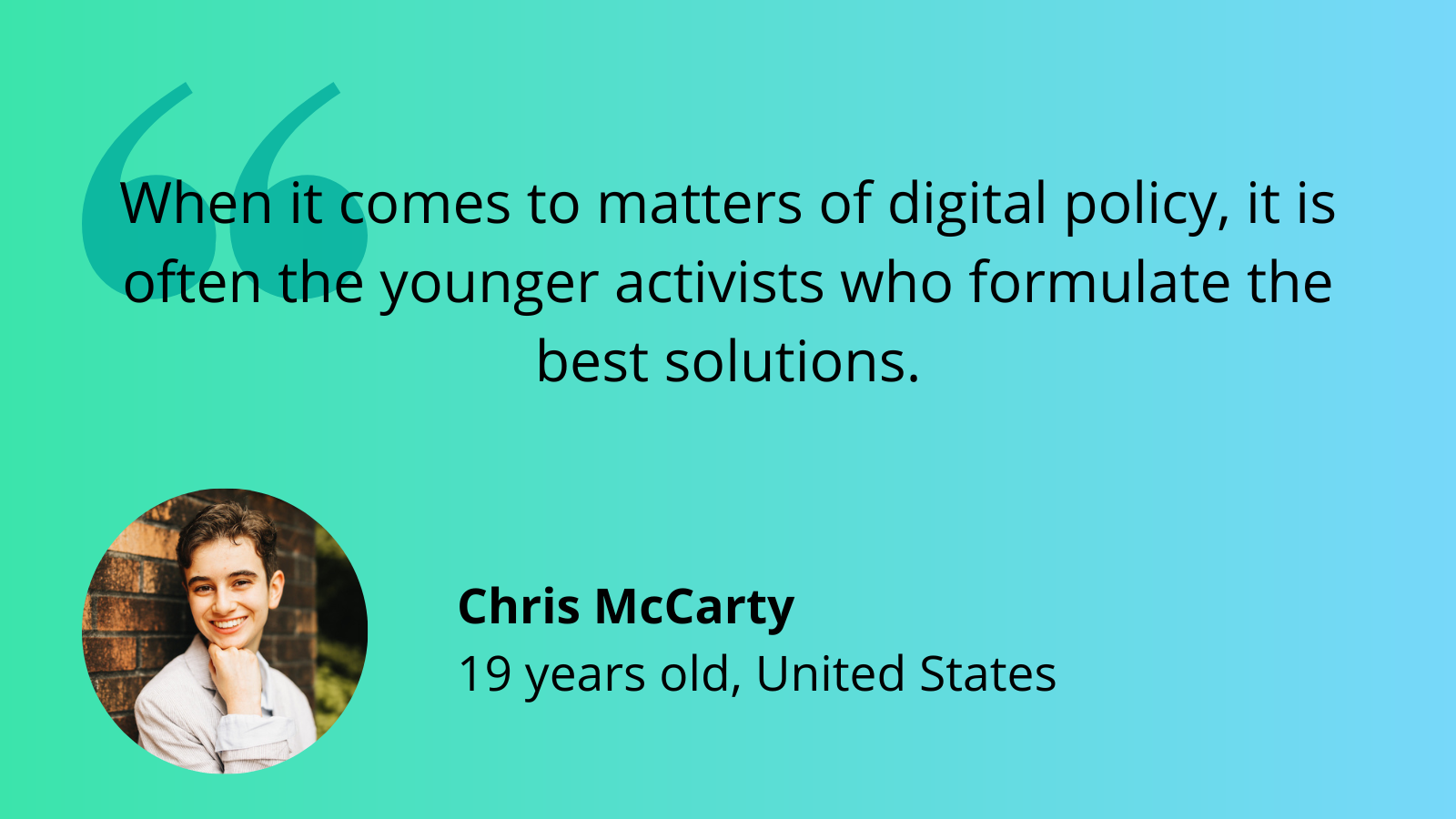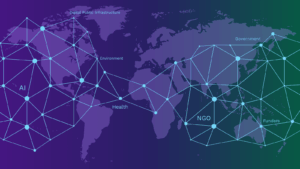In the context of the #Youth4OurDataFuture project, the Datasphere Initiative spoke to a diverse group of young leaders about the role of young people in shaping how data and digital technologies are governed. Through a series of interviews, 19 young people from all over the world shared their insights on what an equitable data future looks like.
All participants were asked about how they would like to get involved in data governance discussions, make an impact, and how their ideas could reach centers of power and decision-makers. In addition to answering these questions, each participant selected two topics to discuss in depth.
Chris McCarty, American, 19 years old, shared an interest in creating public policy to better protect minors online through social media and AI, and their thoughts on SDGs and digital welfare.
Read more about the campaign and other contributions here.
How would you like to get involved in data governance discussions and make an impact? How could your ideas reach centers of power and decision-makers?
As a member of Gen Z who has grown up with the development of social media, the tech industry, and artificial intelligence, I want to make an impact by creating public policy to better protect minors online.
As a high school senior, I worked to craft and introduce legislation (HB 2032) in Washington State with Representative Emily Wicks that would protect children on monetized family social accounts. In 2022, following Representative Wicks’ retirement, I worked to find a new champion for HB 2032. I partnered with Representative Kristine Reeves to re-introduce HB 2032 as HB 1627, and I was able to testify for HB 1627 in committee. As part of my advocacy work, I also manage my own website and social media presence. Change is slow, but if we work together, we can ensure a safer, kinder world.
What are your recommendations for policy-makers in creating a fair and inclusive digital future?
My recommendations for policy-makers are to listen to youth voices. There is a common misconception that just because we are young, we don’t know what we are talking about. But when it comes to matters of digital policy, it is often the younger activists who formulate the best solutions.
It is also important to listen to a wide variety of voices to understand the nuances of a complex issue. There are many angles from which one can understand this issue, and it is important to listen to all of them, not just those with the loudest voices.
Data for the SDGs:
Are you aware of any existing initiatives to leverage the power of data to advance one or more Sustainable Development Goals (e.g., education, health, gender equality)?
There do not appear to be many data-based initiatives to support the Sustainable Development Goals. In the future, I hope to see initiatives that ensure the ongoing development of artificial intelligence is used in a way to better the mental health of minors online.
While I am skeptical of artificial intelligence and the challenges it may bring to society, I think that there is a wonderful opportunity for companies to develop it for the force of good and to reduce the strain on their content moderators.
Perhaps in the future, artificial intelligence can be used to reduce content that is harmful to minors, including that which may impact their sense of self. This applies to children as consumers of social media as well as producers of social media— as many children are monetized on family social media accounts without regard for their privacy and with no guarantee of financial compensation.
Digital Welfare:
What do you think can be done to promote healthier online relationships?
I think that the responsibility of promoting healthier online relationships falls primarily to the ones that facilitate those relationships— namely the social media companies themselves. I think the best method to promote healthier online relationships revolves around media literacy training. Although ideally, social media companies would do a significant portion of media literacy education to better protect consumers, I believe that in an ideal world, media literacy is taught in many different forms, including through schools and parents.
Chris McCarty is the student founder and executive director of Quit Clicking Kids. In 2020, they began researching the behind-the-scenes workings of family influencer accounts and organizing informational webinars about the perils of oversharing online. In 2021, they started cold calling and cold emailing Washington State legislators to craft legislation to protect children online. This legislation (originally HB 2032 and later HB 1627) had two key components: the first component was a right to privacy and the second component was an avenue to financial compensation. While the Washington bill did not pass, it served as a framework for other states. Most recently, HB 1627 in Washington State was the basis for SB 1782 in Illinois, which was signed into law in August of 2023. Chris is now working to bring similar protective legislation to other states and continues to raise awareness through their social media (quit_clicking_kids) and their website.




